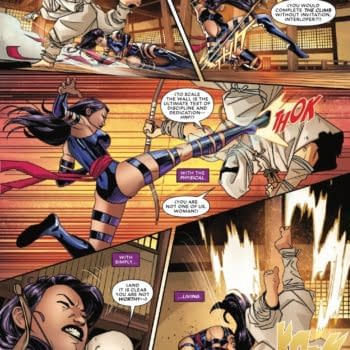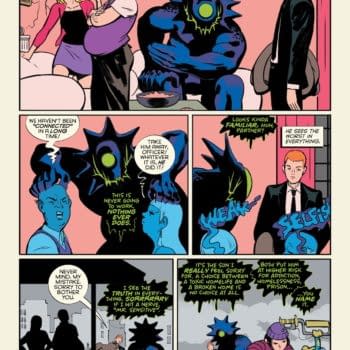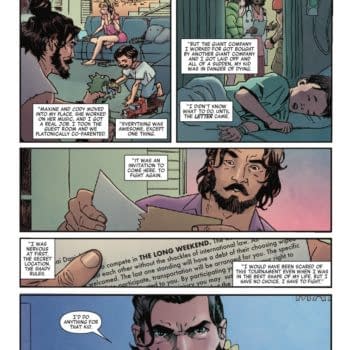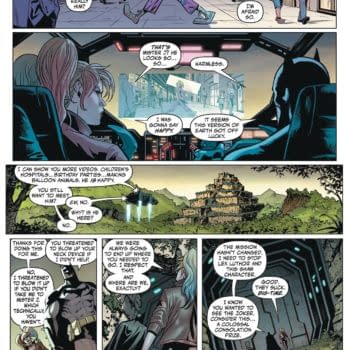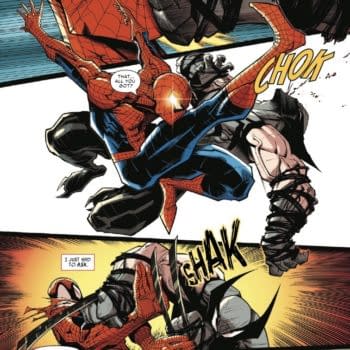Posted in: Comics, Recent Updates | Tagged: Comics, entertainment, film, jared leto, The Joker, tv
The Joker As Sexual Predator: Rape, Queer Readings And Anticipatory Outrage For Suicide Squad
By Bart Bishop
1986's The Dark Knight Returns was the first to play upon stereotypes of gay and transgender panic in portraying the Joker. With an effeminate Joker whose obsession with Batman veers into the romantic, this is coded into Frank Miller's story (especially when considering Miller's greater sexual politics in his other works) as perverse and deviant. This is a thread picked up by the likes of Grant Morrison, Christopher Nolan, the creators of the Arkham games and most recently Scott Snyder, an accepted peculiarity that heightens the Joker's Otherness by putting him in stark opposition to old-fashioned ideas of masculinity and sexual identity. This, of course, makes the casting of Jared Leto in 2016's Suicide Squad immediately suspect.

But the waters have been muddied when it comes to the Joker's sexuality. All-Star Batman, for instance, has him murdering a woman after a night of love-making, and both that series and DKR has him aggressively beating Catwoman in such a way that could be interpreted as sexual assault. There's also, of course, the curious case of The Killing Joke's effect on the industry. So is the Joker a rapist of women, or a straight man's gay panic nightmare? Or is he both? While any differences are welcome in the wake of Heath Ledger's looming shadow, the question is whether or not it's appropriate in 2015 to depict the Joker as a sexual predator, straight, transgender, gay or otherwise. And furthermore, and more importantly, is it okay to have a kneejerk reaction of outrage so far in advance without overt evidence?
Gay and trans panic has a long history as shorthand for evildoing. Antagonists from Alfred Hitchcock's Rope all the way up to Javier Bardem in Skyfall are either coded as gay due to effete mannerisms or are admittedly gay and use that as a weapon against the heteronormative, cisgendered hero, and the same is true of cross-dressers such as Norman Bates in Hitchcock's Psycho and John Lithgow in Dressed to Kill. The idea is that these criminals are already outside the law and acceptable societal behavior, so going against the accepted laws of nature is just another way of heightening their outsider status. Even comics that have been praised for their progressiveness still fall into this easy trap, demonstrating how systemic these tropes are and how they linger even in a culture that's aware of them. The new "Batgirl of Burnside" that gained support from the Tumblr crowd recently came under fire for a Batgirl impersonator opponent that turned out to be a man in drag. The creators experienced a severe backlash followed by a very public mea culpa, and at least a much needed discourse resulted.
The comic book Joker conceptually lends himself to a queer reading. He's dressed in bombastic colors, acts flamboyant and appears to be wearing makeup. Although that was later retconned as chemical burns and bleached skin, his first appearance in Batman #1 gave no explanation. Miller's take, however, is shown applying his own lipstick, and furthermore refers to Batman as "darling" and "my sweet". His final struggle with Batman is exacerbated by the closeness and intimacy of the knife, and is framed as a love scene.

This is one of the few times Batman even acknowledges the Joker's intentions, as generally, such as in Scott Snyder's "Death of the Family" storyline from 2012-2013, he writes off the Clown Prince of Crime as simply insane. That story picked up on Miller's genderbending and ran with it, having the Joker once again redden his own lips, because now he was wearing his face as a mask, a gesture drawing comparison to earlier controversial cross-dressing enfant terribles, Leatherface of The Texas Chainsaw Massacre and Buffalo Bill of The Silence of the Lambs. He also professes his love quite openly and more literally than before, with a master plan centered on murdering Batman's sidekicks in order to have him for the Joker's own.
The Joker's appearances on screen haven't been so blatant. Caesar Romero's Joker was devoid of any insinuation on the 1960s TV show. By 1989 not much had changed with Jack Nicholson in Batman. Although special emphasis is placed on Joker in stereotypical female celebrity situations, such as getting plastic surgery or in the makeup chair, there's never a hint of subverting gender expectations. The Joker, in fact, lusts after Vicki Vale and has a love triangle between him, Vale and Batman. Similarly, Mark Hamill's Joker on The Animated Series is never overt, although his abusive rejection of Harley Quinn suggests a repressed self-loathing. It wasn't until The Dark Knight in 2008 that subtext became text, with Heath Ledger's Joker proclaiming "You complete me," a reprisal of the famous line from Jerry Maguire, and dressing as a female nurse to sneak into Harvey Dent's room. Even these instances are relatively chaste, in line with Christopher Nolan's usual avoidance of sexuality. This did seemingly pave the way for Hamill's Joker to be blunter in the Arkham City video game, with his death being played as mournful for Batman, and him singing "Only You" to Batman over the credits.
So how will Leto's Joker be handled? It depends, of course, on Leto, Zack Snyder and Ayer. Leto has a history of genderbending roles. As far back as Fight Club he was positioned in a homoerotic ménage à trois between him, Brad Pitt and Edward Norton. Of course's there's The Dallas Buyers Club, but one assumes that Leto's casting there stems from an overall softness of features and willingness to undermine masculine tropes, both as rock star in the vein of David Bowie and as bright-eyed celebrity.
On the other hand there's Snyder, who with two previous comic book adaptations has shown an attraction, possibly unconsciously, to homophobia and both slavish fidelity to source material and a willingness to heighten aspects only hinted at in the text. He stays true to 300, also from Frank Miller, with washboard-abs-wielding King Leonidas (historically inaccurately) dismissing boy-loving Athenians while opposing Persian King Xerxes, who in two provocative scenes attempts to seduce Leonidas, placing his hands on the alpha male's shoulders in a more-than-suggestive way, and hosts an outlandishly decadent orgy.
Watchmen, by contrast, has been criticized for its unwillingness to depart from the source material, but one way Snyder put his stamp on the story is his handling of Ozymandias. Revealed as a turncoat at the climax, he is only hinted at being homosexual in the book due to modeling himself off Alexander the Great and, perhaps, for wearing the color purple. In the movie, however, not only is he shown at Studio 54 with the Village People and Ziggy Stardust, but a quick blink-and-you'll-miss-it shot of his desktop computer reveals a file labeled "boys". An Easter Egg, to be sure, but telling both of what Snyder thinks of villains and how blatant and unsubtle his execution can be. So when rumor has it that Suicide Squad's Joker will have huge shoulders like the exaggerated Miller style, and Snapchat selfies show a green-haired Leto with glistening red lips puckered, one can't help but wonder if Snyder is continuing his problematic comic book interpretations.
Which begs the question, when is it too early to be outraged? Suicide Squad is, after all, directed by David Ayer, not Zack Snyder. Harley Quinn's presence in the film could suggest a shying away from any psychosexual elements. And certainly it can't always be off limits to paint homosexuals and transgender characters in a negative light. Except even with Ayer at the helm, this Joker is rumored to have, amongst other things, killed one of Batman's sidekicks, not unlike The Dark Knight Returns. Snyder is getting the ball rolling with a DKR-inspired Batman vs. Superman, and as executive producer of Suicide Squad, along with directing The Justice League, it's safe to say his stamp will be on the whole franchise. Not to mention that Ayer's entire oeuvre is based around hyper-masculine exploration such as Training Day, End of Watch and Fury. Not that accentuating masculinity means vilifying femininity, but it doesn't help. And with the grapevine whispering that Joker first appears in prison, the prison rape connotations will be unavoidable.
As already mentioned, Harley Quinn's presence doesn't suggest much more than her eventual disappointment. In her most famous incarnations, subsequently influencing the comics, in The Animated Series and Arkham games, her sexual advances on the Joker are rebuffed, no matter how scantily clad she presents herself. In fact, this has usually suggested the Joker has no interest in physical intimacy at all, instead focusing on a cerebral brinkmanship with Batman. His few instances of heterosexual attraction, as well, are always accompanied by violence, most famously in 1988's The Killing Joke, of which the two photos released so far of Leto are recreations of iconic Brian Bolland images from that book. Regardless of if the Joker's stripping and taking pictures of Barbara Gordon went further into penetrative rape (no matter what it's sexual assault), later writers and artists have picked up Alan Moore's ball and ran with it. The "Death of the Family" maxi-storyline saw Batgirl forced into a marriage ceremony with Joker, and issue #41 had a highly salacious cover, with Joker's arm around a crying Batgirl, her lips painted red in a rigor mortis like his, a gun pointed towards her crotch. The cover was so controversial it got replaced. While that was sexual assault on a woman, it shows a willingness to write Joker as a predator in all shapes and sizes in attempts to escalate his insidiousness.
So the real question is should it matter if the Joker is played as gay or transgender, and should rape be allowed into his repertoire? The straightforward answer is that some associations are impossible to avoid, but homosexuality or transgenderism shouldn't be a facet of villainy. At least as far back as Richard III, Shakespeare having described the man as a hunchback to externalize his internal demons, any non-traditional sexual practice has been viewed as malicious by mainstream society. The Joker, who is already a visual compilation of many western fears, doesn't need to also threaten his victims, and especially Batman, with sexual violence.
The idea of him being "weird" and "unnatural" is taken to a problematic place when his idée fixe on Batman takes on an erotic angle, and just play into ideas of homosexuality and transgenderism being funny because they're uncomfortable subjects for the ignorant. Rape, meanwhile, has been too easy a go-to, highlighted by huckster Mark Millar's comments on his own Kick-Ass 2 in 2013: "The ultimate [act] that would be the taboo, to show how bad some villain is, was to have somebody being raped, you know? I don't really think it matters. It's the same as, like, a decapitation. It's just a horrible act to show that somebody's a bad guy." That's just too easy, now isn't it? It's too easy to play upon the fridging of women as victims to be avenged. It's far more rewarding to dramatize more visceral, universal evil than modern societal prejudices personified. At the very least these subjects should be handled with nuance, grace and tact, something prior creators haven't demonstrated in the least when it comes to the Joker.
So this is all guesswork at the moment, but it's educated guesswork. Knowledge of the Joker over the last 30 years worth of media suggests this is the direction he has been heading. Certainly we could know in a few months when a trailer premieres, but we can only really know when the movie comes out. For that reason a take can't be dismissed initially, but although it can be fruitless to be outraged too early, it's enlightening to be prepared.
Editor and teacher by day, comic book enthusiast by night, Bart has a background in journalism and is not afraid to use it. His first loves were movies and comic books, and although he grew up a Marvel Zombie he's been known to read another company or two. Married and with a kid on the way, he sure hopes this whole writing thing makes him independently wealthy someday. Bart can be reached at bishop@mcwoodpub.com.












